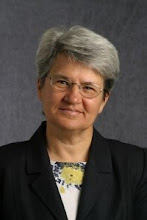
This past Sunday, dignitaries from the Bracknell Forest Borough gathered for the Annual Civic Service, led by Mayor Ian Leake and Mayoress Enid Leake. The affair was held at the Binfield All Saints Church in the Parish of Binfield, in the Royal Country of Berkshire.
Reverend Duncan Leake based his address on readings taken from Daniel 1 and Romans 13.The Vicar shows how Daniel faces the challenge of living as a stranger and an alien in Babylon. In some cases he cooperates and seeks to bring blessing to the Babylonians by serving them faithfully. In other cases, he refuses to compromise his faith. In many ways our own situation is like that of Daniel, concludes Leake, calling upon government officials and citizens alike to pursue justice, dispense mercy and walk humbly before God.
This moving ceremony concluded with our singing, 'I Vow to Thee My Country'. The words of this great English hymn were written in 1918 by Cecil Spring-Rice with music added three years later by Gustav Holst. This hymn was composed after World War I, the first verse referring to England, the second to Heaven. This piece of music was made famous when Princess Diana requested it for her wedding and it was sung at her funeral. In national polls 'I Vow to Thee My Country' placed among the contenders to replace 'God Save the Queen'.
Just consider these stirring words accompanied by most majestic music -
I vow to thee, my country, all earthly things above;
entire and whole and perfect, the service of my love.
The love that asks no question, the love that stand the test,
that lays upon the alter the dearest and the best,
the love that never falters, the love that pays the price,
the love that makes undaunted the final sacrifice.
And there's another country, I've heard of long ago;
most dear to them that love her, most great to them that know.
We may not count her armies, we may not see her King.
Her fortress is a faithful heart, her pride is suffering.
And soul by soul and silently her shining bounds increase
and her ways are ways of gentleness and all her paths are peace.
All I can contribute to this is to say, Amen.







